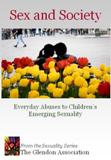3 Questions that Can Change the Way You Feel About Sex
 Your sexuality is an important part of who you are. This is true regardless of whether you’re in a relationship and whether or not you’re having sex. Whatever your situation, being alive to your sexuality is about to being true to and accepting of yourself; it is not about anyone else. It can mean different things for different people, but it often involves allowing yourself to experience attractions, expressing interest and affection, being aware of what you want and accepting of what you feel.
Your sexuality is an important part of who you are. This is true regardless of whether you’re in a relationship and whether or not you’re having sex. Whatever your situation, being alive to your sexuality is about to being true to and accepting of yourself; it is not about anyone else. It can mean different things for different people, but it often involves allowing yourself to experience attractions, expressing interest and affection, being aware of what you want and accepting of what you feel.
When you lose touch with this part of yourself, you can lose a sense of vitality. Yet, many people retreat from or turn against certain aspects of their sexuality. Whatever form this takes for each individual, most people harbor negative attitudes toward themselves or toward sex that get in the way of their feeling completely free, easy, and in touch with this part of themselves. These attitudes may originate from things they picked up on, witnessed, or were told directly in their family or by society. It may come from ways they were seen or treated and, therefore, internalized toward themselves.
As people grow up, they absorb these attitudes and often experience them as an internal commentary or a “critical inner voice” that attacks their sexuality. This inner critic may feed them harsh thoughts toward themselves, their partner, or sex, in general. Some examples I’ve heard from men and women recently include:
- “You’re so ugly. No one would want to see you naked. Cover yourself up.”
- “Sex is gross. You should try not to think about it.”
- “He’ll think you’re a slut if you sleep with him.”
Though it’s often critical, this inner voice can be tricky, because it can also sound soothing or self-protective, however, it still tends to limit people with thoughts like:
- “Don’t show her you like her. You’ll just be rejected.”
- “Never make the first move. You’ll make a fool of yourself.”
- “Sex will just make you self-conscious and awkward. You should avoid it.”
These examples may or may not be thoughts you relate to yourself. However, pretty much every person I’ve ever asked, as an exercise, to write down their critical inner voices around sex are surprised by how many things come out. These range from extremely specific criticisms of their body to nitpicky attitudes toward their partner or potential partners to pretty scathing attitudes toward sex or wanting. Because these “voices” often source from the past, to get in touch with your sexuality and whatever it really means to you, you have to peel away the negative overlays of your critical inner voice.
Here are three questions to ask yourself to help you uncover your own personal, honest feelings toward sexuality. These questions will help you explore the overlays that may have helped shape your inner critic and separate these attitudes from your real feelings and present point of view about sex.
- How did you learn about sexuality?
What are your first memories around learning about sex? Did your parents give you “the talk” or was sex never addressed? What were you told directly? What did you pick up from the way people spoke or how they acted? What attitudes about sex surrounded you, whether from your parents, friends, community, society, or even from TV? How do you think the attitudes you picked up or information or advice you received may have influenced you when you when you became sexually active?
- What are your critical inner voices about sex?
Do you have a nasty coach in your head when it comes to your sexuality? Does it criticize you for wanting? Does it pick apart how you look? Does it make you feel unattractive or undesirable? Does it cause you to doubt yourself or your performance? Does it filter people who are attracted to you through a negative lens? Does it get nitpicky toward your partner, undermining your attraction? Do these “voices” make you not feel like yourself when it comes to sex? Do they hold you back or make you nervous or insecure? Do they tell you that sex is dirty or bad in some way?
If you write down these voices, try to phrase them in the second person, as “you” statements rather than “I” statements. This can help you start to separate from the critical thoughts rather than accept them at face value as your own point of view. It may even help you start to recognize where these attitudes originally came from. For example, a woman wrote down, “You should be ashamed of yourself for wanting so much. Don’t be needy. You’re so desperate and gross. Don’t let anyone know you want anything.” As she wrote, she noticed that she was imagining the words in her head in the voice of her mother. When she thought more about it, she remembered her mother frequently calling her “needy” as a little girl and warning her about seeming “desperate” to boys as a teenager. She also remembered that her mother never showed any affection to her father in her presence. This realization gave her some perspective on what she felt about sex as opposed to what her mother had expressed.
- What are your own personal values around sexuality?
Two things can be helpful when uncovering your true point of view about sex. The first is to respond to your critical inner voices. You may line a second sheet of paper up with the first and respond to each “you” statement with an “I” statement that’s more realistic, kind, and reflective of what you really think. For example, for the woman I mentioned above, she wrote in response to her critical inner voice attack, “There is nothing wrong with wanting. I am not gross or desperate, and neither is my sexuality. I don’t have to be ashamed to express what I feel. It’s a positive part of who I am.” When you respond to your critical inner voices, remember to stay on your own side and keep a self-compassionate attitude. Talk to yourself like you would to a good friend.
The next thing to do is ask yourself what are your own, personal beliefs about sex. What is your attitude about sexuality in relation to yourself? Toward others? What does being alive to your sexuality mean to you? How does it make you feel? What would it feel like to accept yourself in this area of your life? What is your ideal expression of your sexuality? Try to weed out your inner critic as you find your own voice.
Sexuality is a unique and meaningful way to feel close and connected to someone else, but no one else can tell you how to feel about your sexuality. When you can uncover and accept your own feelings, you can feel much freer and more fulfilled in your sexual relationships, but you can also feel much more vital and connected within yourself.










My sex drive was murdered by my ex narcsisst by his transparent infidelities, body and orgasmic comparisons. He chose to do this verbally in bed. Thus killing my drive. Although I’m aware of what’s happened and it’s been some time since our break-up I can’t make my body respond to stimulation. I’m hoping you will direct me accordingly, please.